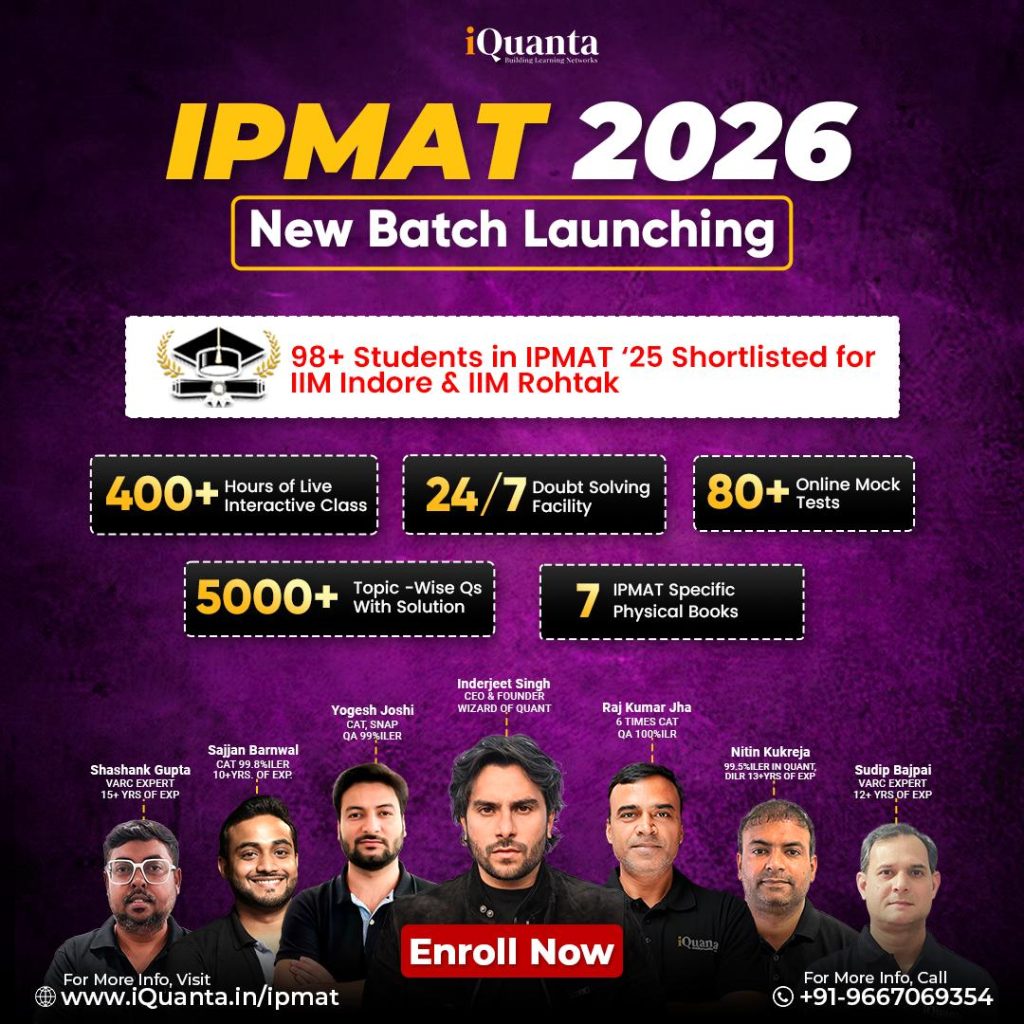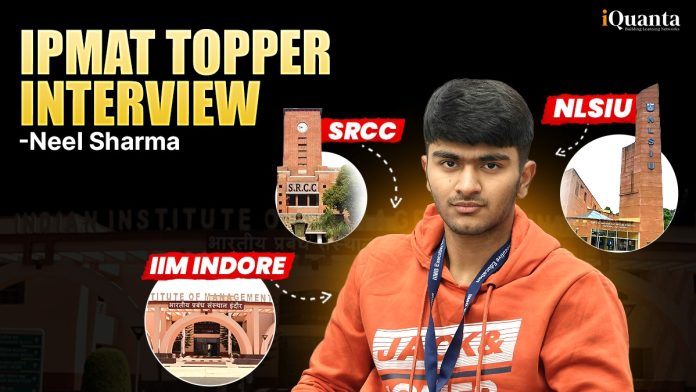IPMAT Indore Topper Interview: Cracking a single competitive exam is a feat in itself, but when someone clears three of India’s most competitive undergraduate entrance exams, it’s worth diving into their journey. Today, we feature Neil, a remarkable student from iQuanta, who not only cleared IPMAT Indore and secured admission to IIM Indore, but also cracked CUET UG (to get into SRCC) and CLAT UG (to get into NLSIU Bangalore), India’s top law school.
What makes Neil’s journey so special is not just the outcome, but the discipline, planning, and resilience behind it. In this detailed interview hosted by iQuanta, Neil shares how he balanced school, board exams, and multiple entrance tests with clarity and confidence.
Join this free whatsapp group for IPMAT free resources, preparation tips by toppers, latest updates and more

IPMAT Indore Topper Interview by iQuanta
This insightful conversation was brought to you by iQuanta, a well-known platform for aptitude-based exam preparation. In the interview, Neil opened up about his routine, mindset, preparation methods, and how he overcame hurdles like backlogs and exam anxiety.
When asked about his results, Neil said:
“It feels awesome. A whole year’s hard work has finally paid off.”
From starting early in class 10 to staying consistent throughout class 11 and 12, Neil’s story reflects what smart work and self-awareness can achieve.
Preparation Strategy of IPMAT Indore Topper
Neil’s preparation for IPMAT and other exams was guided by a smart, structured approach. Here is a breakdown of the key strategies that helped him:
1. Time Compartmentalization
- Neil divided his time clearly between schoolwork, board exam prep, and entrance exam prep.
- He created fixed time blocks for each subject or exam.
- This approach ensured balanced progress without feeling overwhelmed.
2. Early Morning Routine
- He started his day at 5 AM.
- Morning sessions were used for math formula revision, which helped in both IPMAT and CUET prep.
3. Daily Planning and Scheduling
- School hours were from 8 AM to 3:30 PM.
- After school, he took a short break and then resumed studies around 4:30 PM.
- He studied for CUET, IPMAT, and board subjects in dedicated one-hour slots.
4. Focused Study Sessions
- Neil believes in quality over quantity.
- His motto: “One hour of focused work is more valuable than three hours of distracted work.”
5. Mock Test Integration
- He gave 3 mocks per week initially and increased it to 5-6 per week after boards.
- Each mock was followed by a thorough analysis using a logbook to track mistakes.
6. Weekly Review and Backlog Clearance
- Neil never allowed backlogs to stretch beyond the week.
- If he missed anything during the week, he would catch up by Sunday.
7. Using Multiple Resources
- For weak topics, he relied on iQuanta classes, recorded lectures, YouTube videos, and textbooks.
- He practiced a variety of question types to increase familiarity with all formats.
8. Stress Management
- Neil included workouts, prayer, and occasional video games in his routine to maintain mental balance.
9. Moderation Over Obsession
- He avoided burnout by not overloading himself.
- Balanced effort across studies and relaxation helped him stay consistent throughout the year.
Join this free whatsapp group for IPMAT free resources, preparation tips by toppers, latest updates and more

How Many Hours Does the IPMAT Indore Topper Study?
Neil did not believe in setting fixed long hours. Instead, he focused on productive hours. On average, he studied for about 3 to 4 focused hours per day, outside school hours. He emphasized that:
“Moderation is key. You don’t need to study 10 hours a day. Just make sure whatever time you study is used well.”
He also highlighted the importance of daily achievable goals rather than large overwhelming targets.
How Many Mocks Does the IPMAT Indore Topper Take?
Mocks were an essential part of Neil’s prep. His mock-taking strategy included:
- 3 mocks per week until board exams were over.
- 5-6 mocks per week after the boards.
- He maintained a mock logbook to track mistakes and recurring problem areas.
Neil’s golden rule: One well-analyzed mock is worth 10 mocks written.
Rather than just increasing the number of mocks, he focused on extracting insights from each one and then revisiting those weak spots.
How Did the IPMAT Indore Topper Clear Backlogs?
Neil had a strict approach to clearing backlogs:
- He set weekly goals and ensured any missed topics were covered by Sunday.
- He avoided pushing unfinished work into the following week.
- He always had a backup day (usually Sunday) for catch-up, revision, or lighter practice.
- He also built consistency by solving smaller sets of questions regularly rather than large chunks all at once.
This approach helped him maintain clarity and avoid mental fatigue.
IPMAT Indore Topper Interview – Parent’s Perspective
Neil’s father also played a key role in his journey. A seasoned professional who once prepared for CAT himself, he understood the importance of self-discipline and emotional support.
Here are key insights he shared:
- Parents should guide, not control. Let children make logical choices and support them in their path.
- Ask your child “why” at every decision stage until both parent and child are confident.
- Once the decision is made, trust the process and become a part of it as a team.
- Regular conversations, such as dinner-time check-ins, help maintain communication and motivation.
- Don’t outsource everything to coaching centers. Stay involved and encouraged throughout the preparation.
His message to other parents was clear:
“Once you and your child choose a path, walk it together as a unit. Don’t dump your anxiety on them.”
Watch IPMAT Indore Topper Interview Here
If you are looking for a structured preparation for IPMAT along with 24×7 doubt solving, then you can go for iQuanta’s IPMAT Course

IPMAT Indore Topper Interview FAQs
He started during the Class 10 after achieving 95.5 per cent marks in the boards.
Yes, he has always looked more towards the management career because he was inspired by the position enjoyed by his father.
Of course, there were backup options like CLAT and CUET. He was concentrated mainly on IPMAT and management.
With prayer, exercise, games and achievable goals. He did not overwork himself.
It is all about the quality of mocks analysis, not upping the quantity, keeping a log of the mistakes you make, and being consistent in having a moderate but balanced approach.




